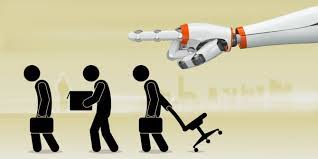Will Robots Steal our Jobs?
Article Synopsis :
‘Will Robots Steal our Jobs?’ by PwC is an international analysis of the potential long-term impact of automation on the jobs of today. The report identifies three waves of automation between now and the mid-2030s:

Though job displacement is a valid concern with AI, it will create more economic value on a net basis over the long term
- Algorithm wave
- Augmentation wave
- Autonomy wave
High-level findings include:
- In the first wave up to the early 2020s, relatively few jobs will be automated but financial services could be relatively highly impacted
- Up to 30% of existing jobs could be impacted by the mid-2030s, with the transport, manufacturing and retail sectors particularly affected
- There should be broadly offsetting job gains provided investment is made in retraining
The research analyses the tasks and skills involved in the jobs of over 200,000 workers across 29 countries, including over 5,500 workers in the UK. The study suggests that more women will initially be impacted by the rise of automation, whereas men are more likely to feel the effects in the third wave by the mid-2030s. This is due to the types of tasks that are more susceptible to automation and the current gender profiles of employment by sector. John Hawksworth, chief economist at PwC, sums up the opportunities – and challenges – quite nicely: “We don’t believe that automation will lead to mass technological unemployment by the 2030s, any more than it has done in the decades since the digital revolution began.”
In the long run, AI, robotics and related technologies should not only make a significant contribution to UK GDP of up to 10%, but should also generate enough new jobs to broadly offset the potential job losses associated with automation.
Continues Mr. Hawksworth, “But we should not be complacent about the coming waves of automation: there will be challenges to many workers to adapt to these changes through enhancing their skills and retraining for new careers in some cases. Governments, businesses, trade unions and educational providers will all have a role to play in helping people through this transition.”
A little more detail about each of the three waves:
Algorithm wave – to early 2020s
The algorithm wave is already well underway and involves automating structured data analysis and simple digital tasks, such as credit scoring. Only a relatively small proportion of jobs in the UK, between 2-3%, are likely to be impacted during this time, as many of the technologies are still at an early stage of development. PwC finds financial, professional and technical services, and information and communications sectors likely to be the most affected at around 6-8%. Women could be more exposed than men at this stage due to their higher representation in clerical tasks in the more affected sectors.
Augmentation wave – to late 2020s
The augmentation wave is focused on automation of repeatable tasks and exchanging information, as well as further developments of aerial drones, robots in warehouses and semi-autonomous vehicles. PwC estimates the share of potential jobs affected could rise to up to 20% by the end of the 2020s, as the use of AI systems becomes much more widespread and robotics technologies advance and mature. Over this period, the effects will be felt across all industry sectors, although financial services is still expected to be the most impacted sector. Women are still marginally more exposed than men in this wave, although the gap narrows. Level of education also starts to become a determining factor, with low and medium education levels (i.e. below graduate level) starting to show higher automation risk levels, than those with higher education levels (i.e. graduates and above).
Autonomy wave – by mid-2030s
In this wave, AI will be able to analyse data from multiple sources, make decisions and take physical actions with little or no human input. The share of jobs that could be impacted by automation is estimated to rise to 30% by the mid-2030s, as autonomous robots and driverless vehicles roll out more widely across the economy. PwC analysis suggests that this is the phase when many more manual tasks could become capable of being automated, pushing sectors like transport, manufacturing and retail to the top of the likely automation list. This is also the phase when men are likely to be more impacted than women, due to their greater share of employment in manual jobs in areas such as driving, factories and warehouses. This is also true for less-educated workers, as the variation between education level widens.
Bottom line, PwC predicts that AI and related technologies will ultimately boost productivity, income and wealth. As this additional income and wealth is spent or invested, it will generate increased demand for human labour in less automatable sectors. PwC’s economic modelling suggests that this job creation effect will broadly offset the potential job losses associated with automation in the long run.
Link to Full Article:: click here
Digital Insurer's Comments
We view artificial intelligence (machine learning) as a horizontal enabling layer that will make every business / university / government / not-for-profit better, faster, and smarter. Unfortunately there’s a lot of bad press around ‘evil AI’ and its ability to eliminate not only human jobs, but mankind itself.There is no path to making AI sentient. In the words of machine learning pioneer Andrew Ng, “Worrying about ‘evil AI’ is like worrying about human overpopulation of the planet Mars.” But job displacement is indeed a serious issue – the issue with respect to AI. Reports such as this one, employing a data-based approach to the coming problem, are part of the solution.
Link to Source:: click here























































Comments